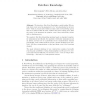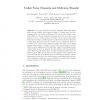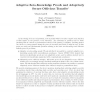42 search results - page 6 / 9 » Cheating in Visual Cryptography |
110
click to vote
TCC
2005
Springer
15 years 8 months ago
2005
Springer
Abstract. We introduce Fair Zero-Knowledge, a multi-verifier ZK system where every proof is guaranteed to be “zero-knowledge for all verifiers.” That is, if an honest verifi...
118
click to vote
TCC
2004
Springer
15 years 7 months ago
2004
Springer
In a paper from EuroCrypt’99, Damg˚ard, Kilian and Salvail show various positive and negative results on constructing Bit Commitment (BC) and Oblivious Transfer (OT) from Unfair...
134
click to vote
JCP
2007
15 years 2 months ago
2007
— Integrity of digital documents is a very important issue if they are to be legally binding. Common solutions, like digital signatures or message authentication codes, are based...
159
click to vote
JDCTA
2010
14 years 9 months ago
2010
In visual cryptography, the secret can be any written text, graphical representation, or picture. This technique, some time called visual secret sharing (VSS), allows visual infor...
120
click to vote
TCC
2009
Springer
16 years 3 months ago
2009
Springer
In the setting of secure computation, a set of parties wish to securely compute some function of their inputs, in the presence of an adversary. The adversary in question may be st...



